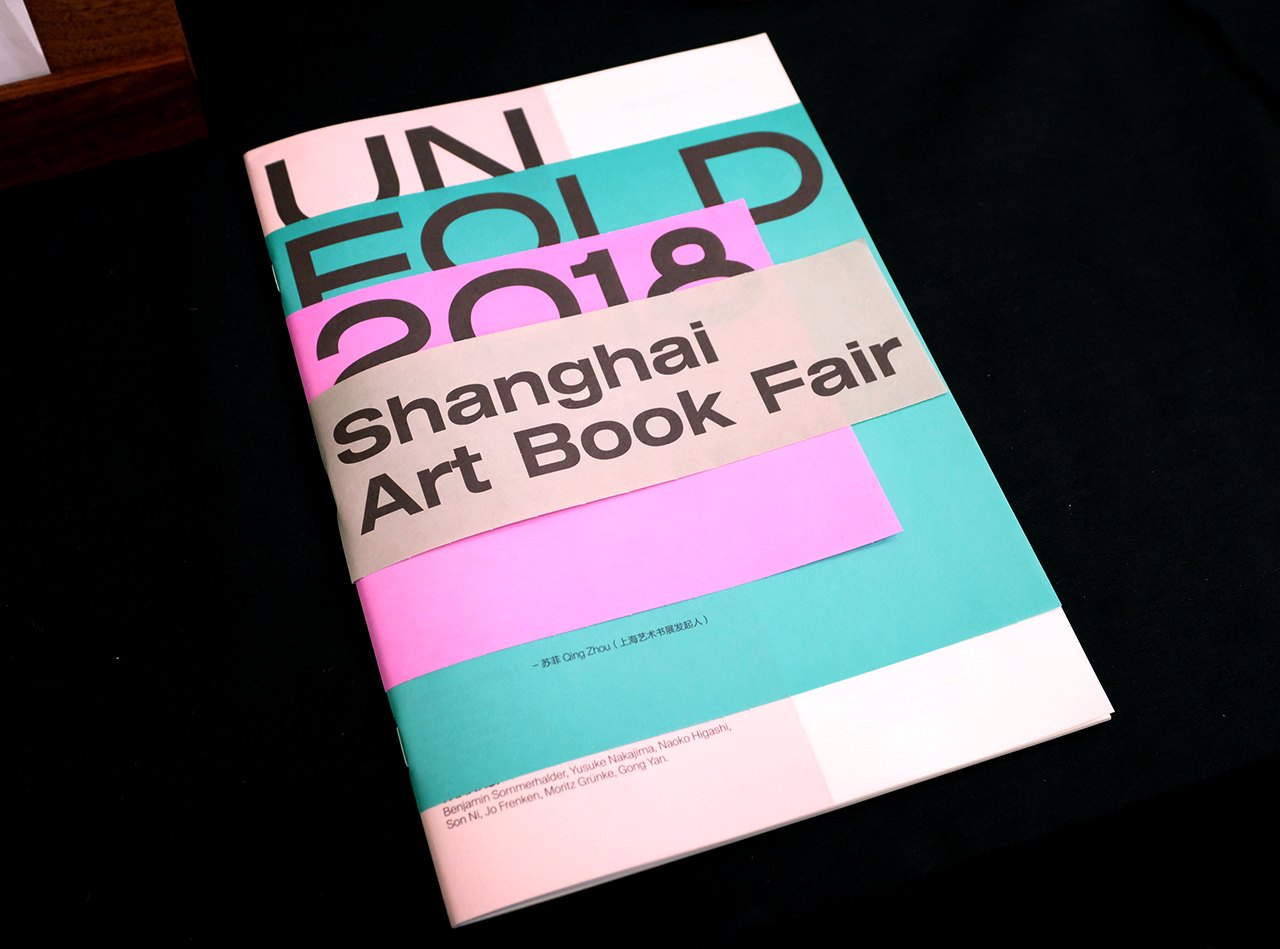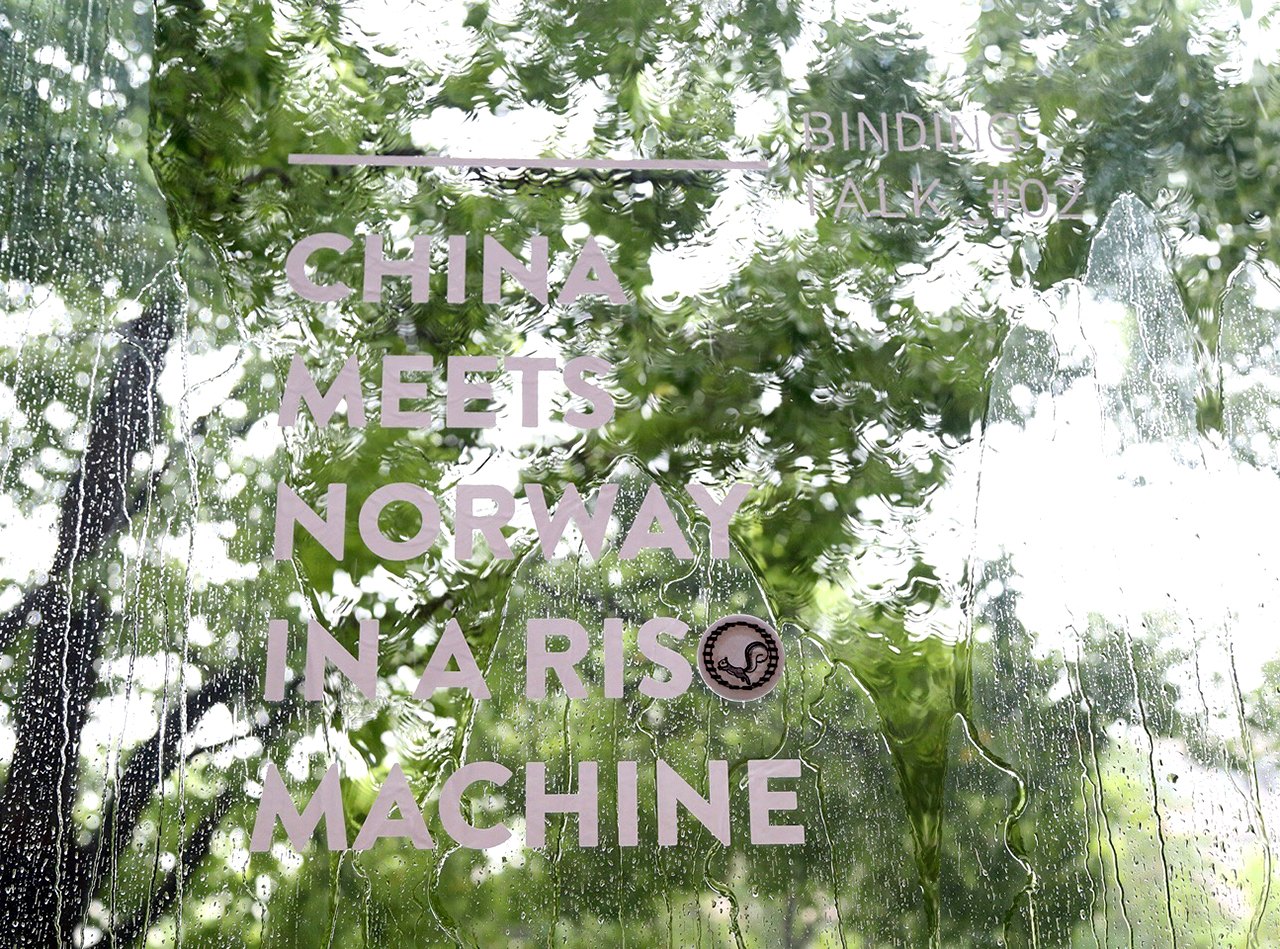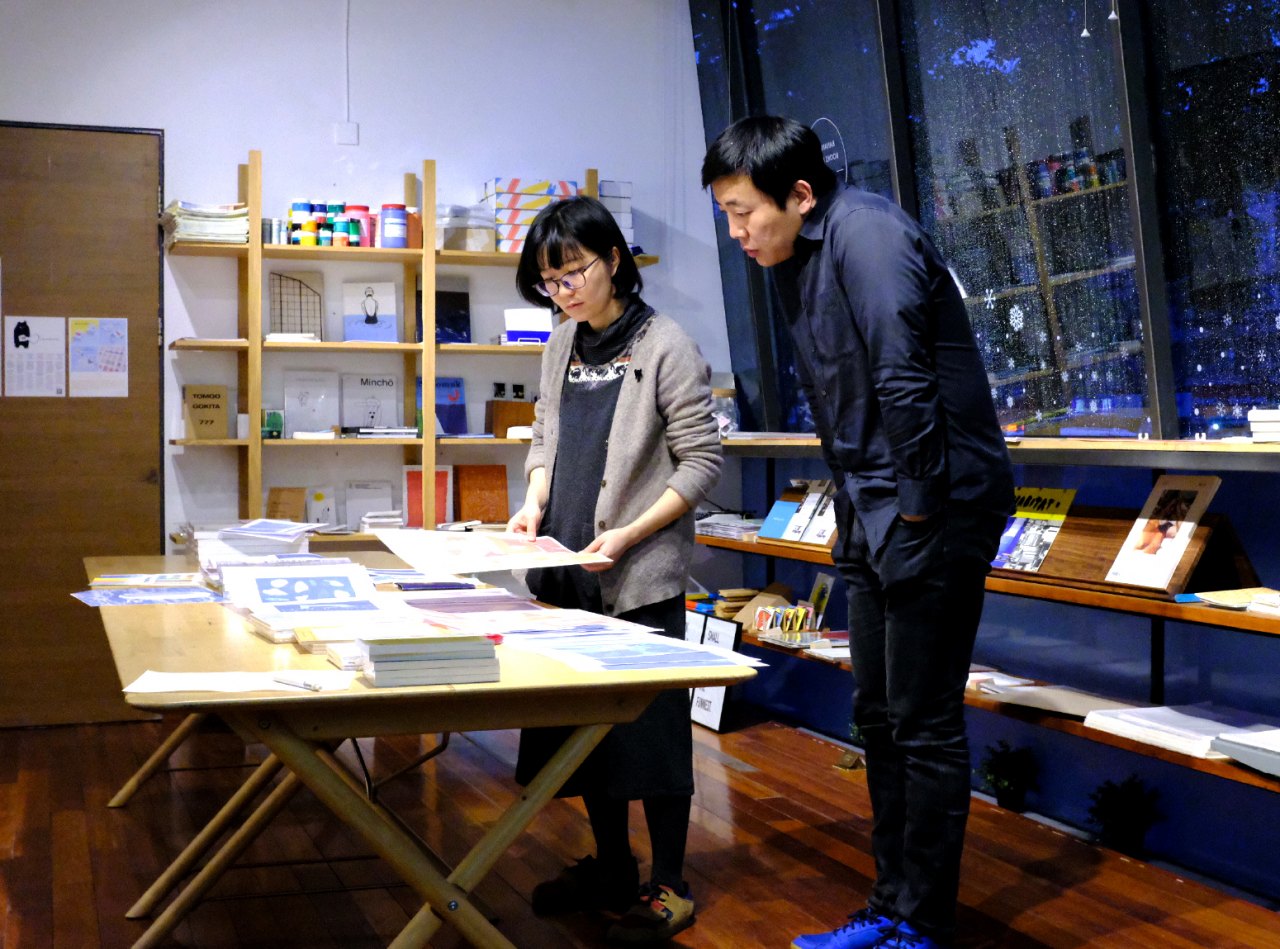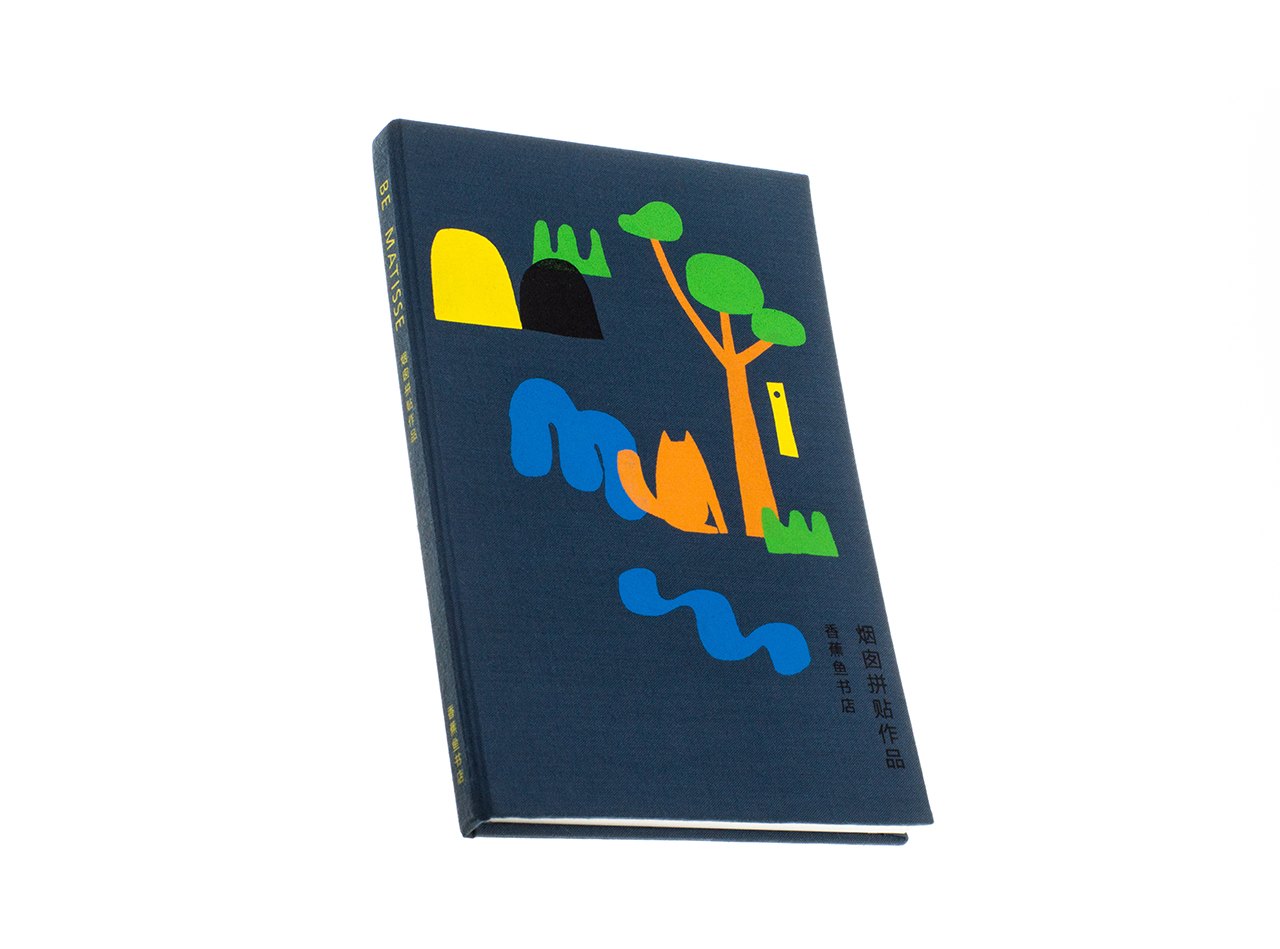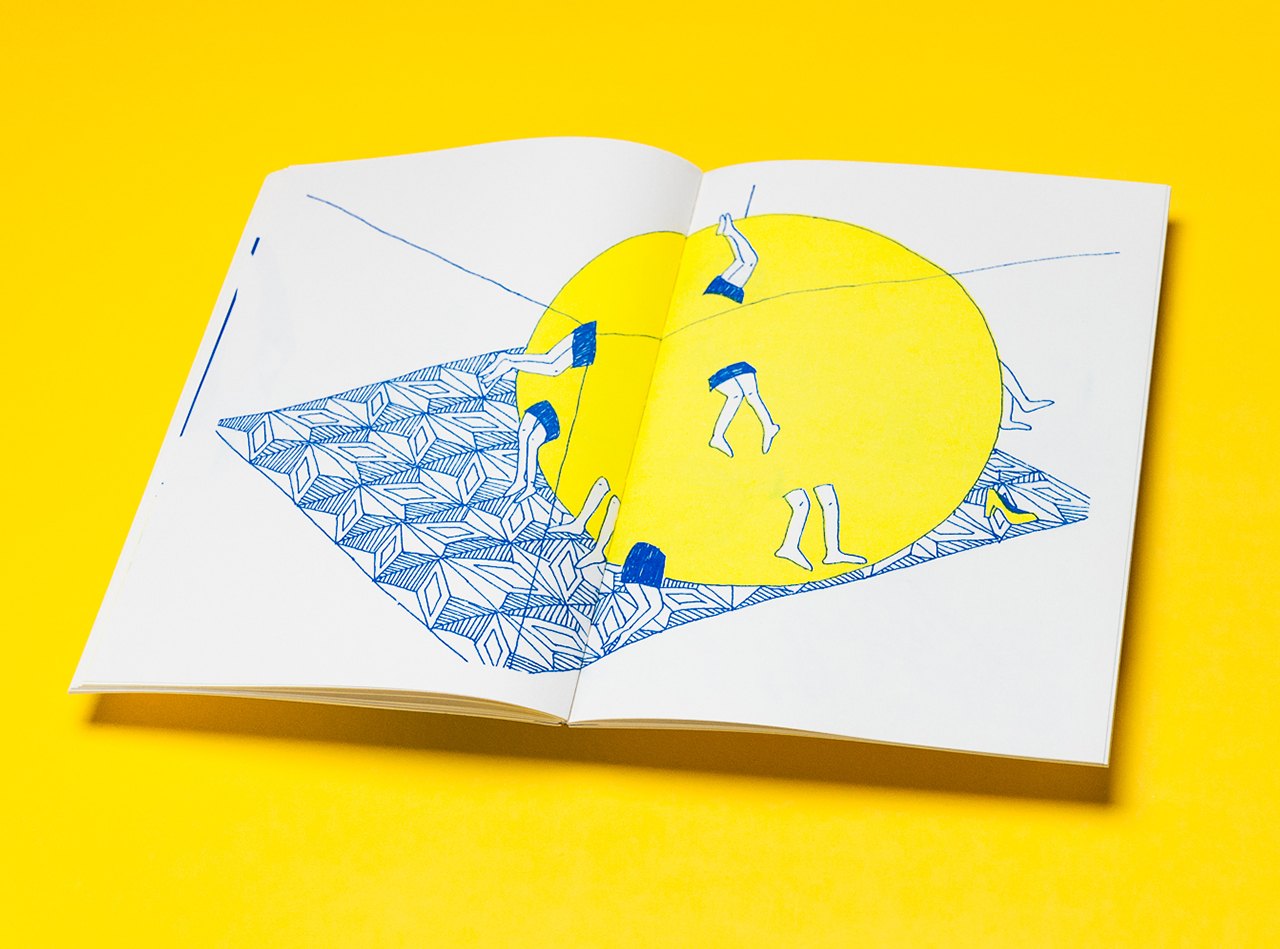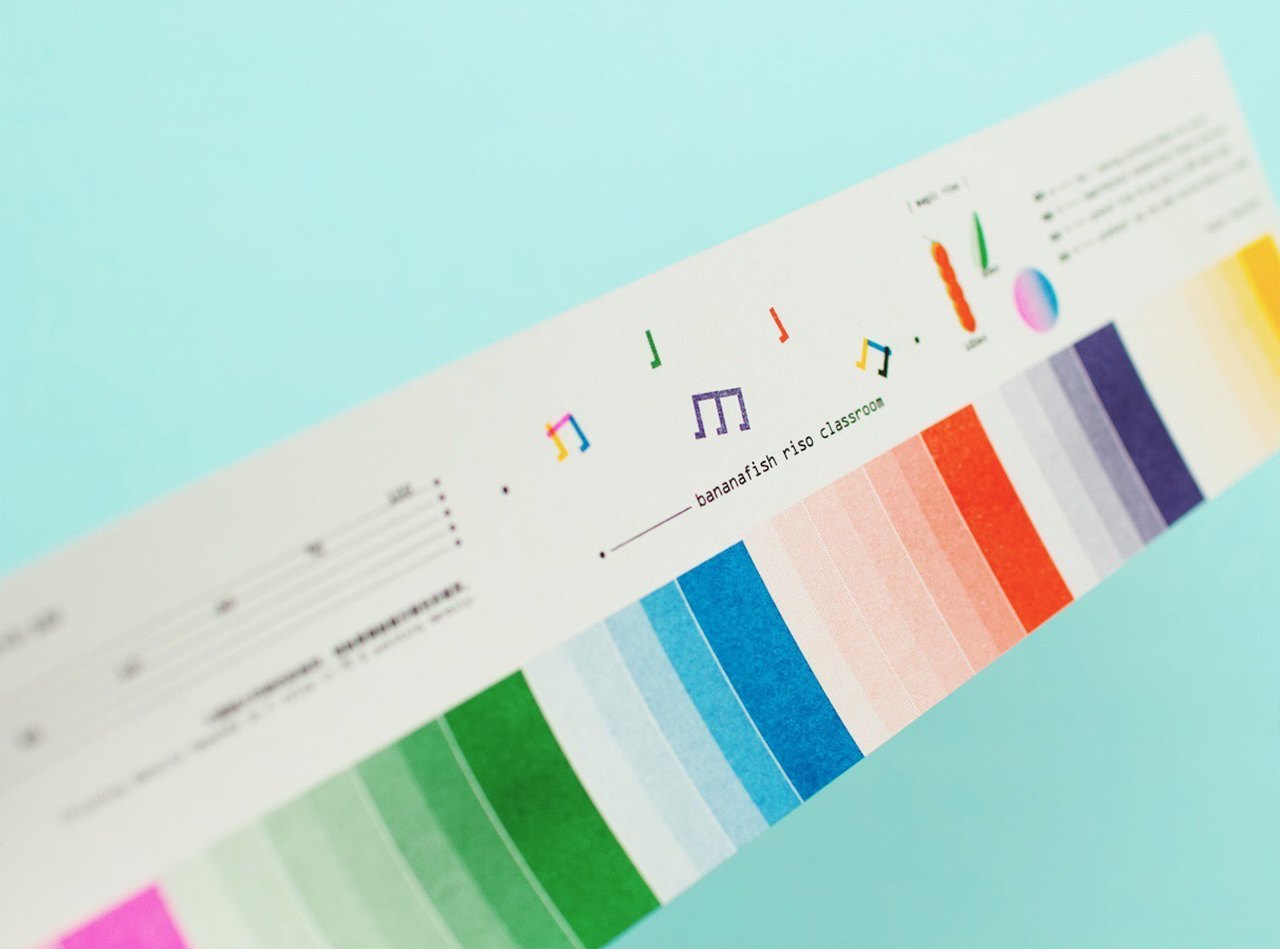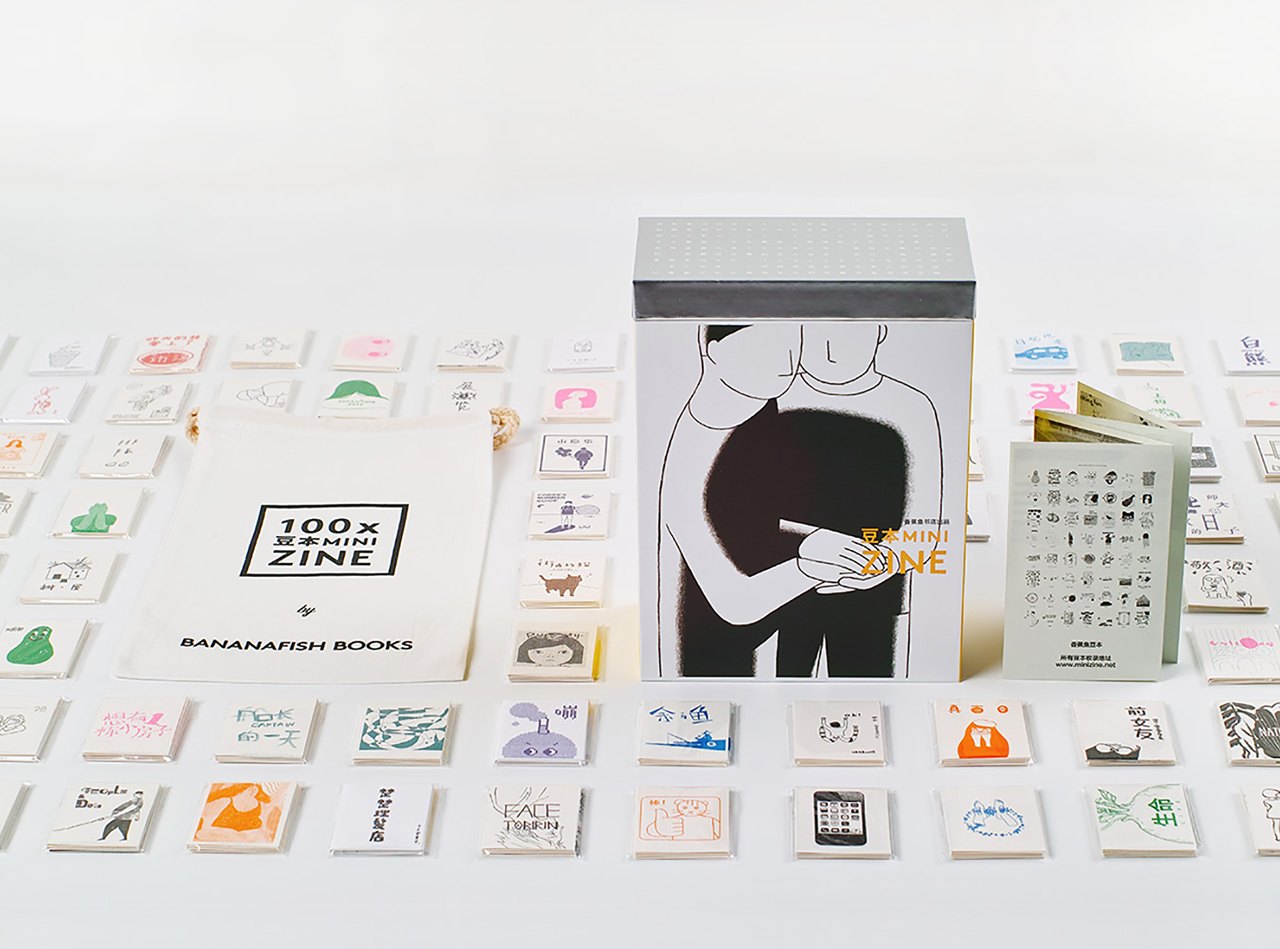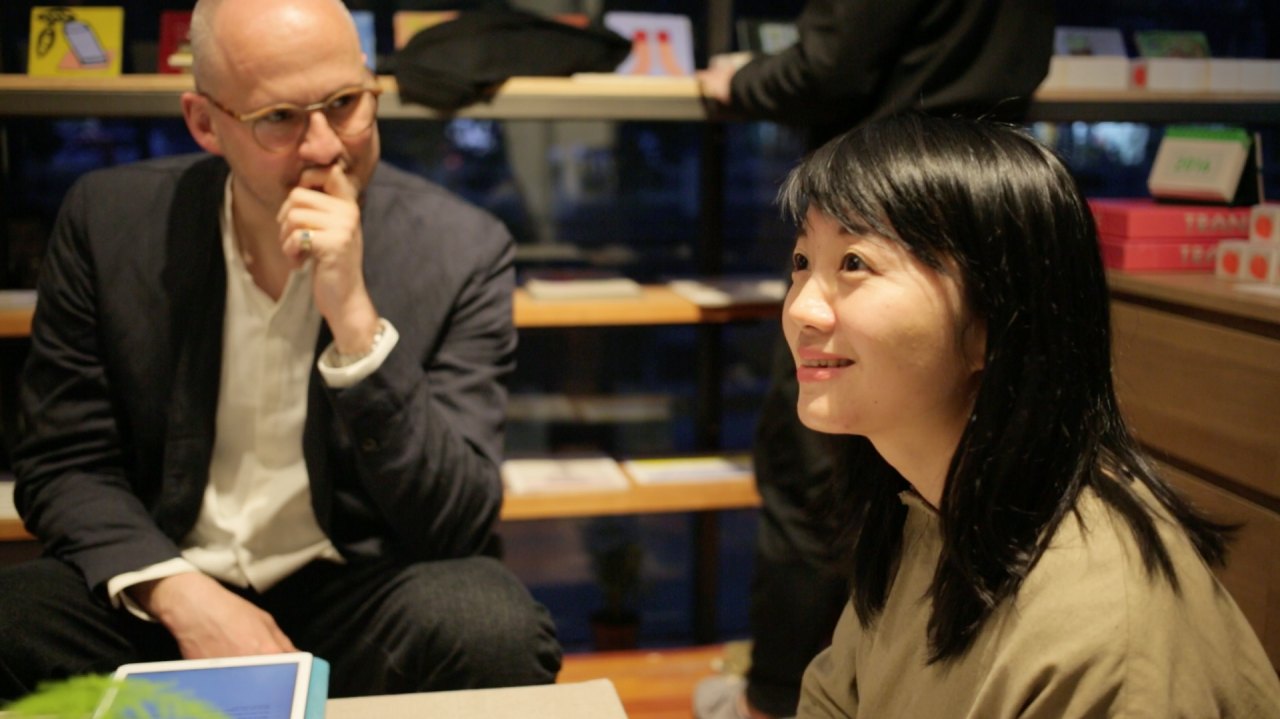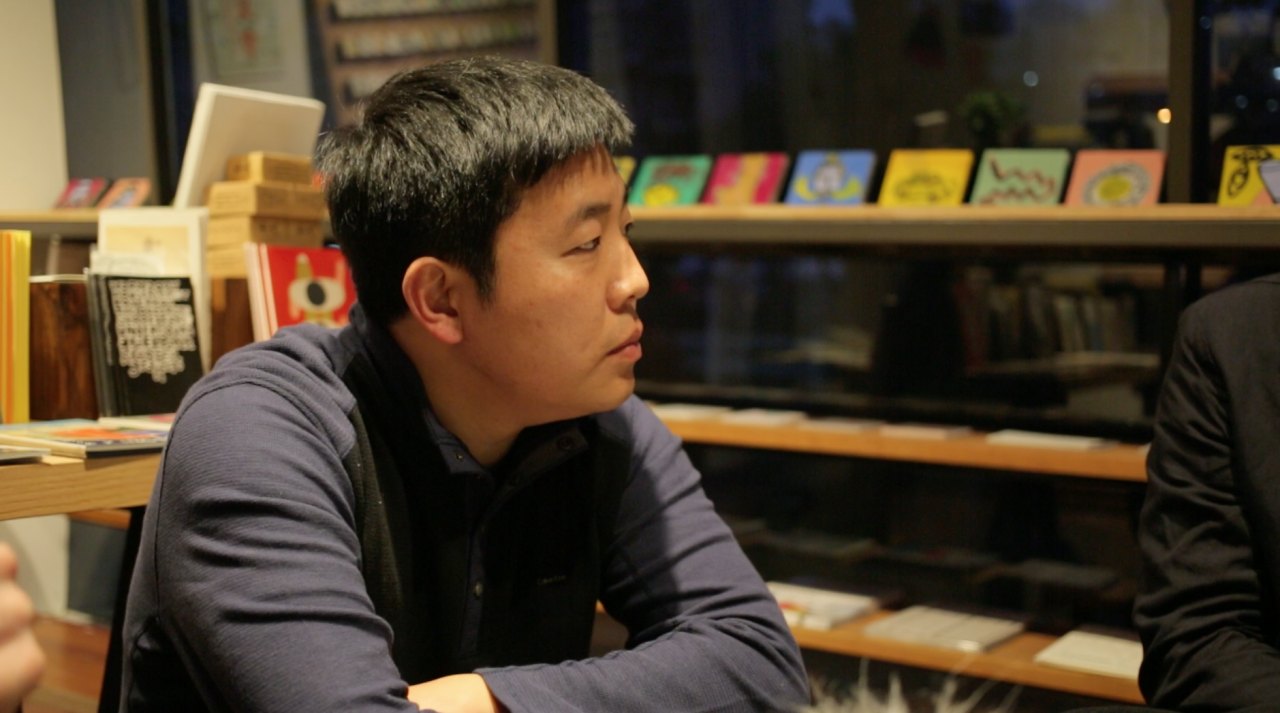Bananafish
Bananafish Books was established by Su Fei and Guan Wei in 2010 as the first art book bookstore which focus on importing independent publishing around the world. Bananafish Books is the pioneer of “independent publishing” in China, with the aim liberating self and small scale publishing from the traditional system. Both Su Fei and Guan Wei received their master degree in UK and Germany respectively. Both gained a lot of experiences and knowledge through visiting local independent bookstores, and brought their passion back to China. http://a-perfect-book-for-bananafish.com/
The Interview took place in March 2016. Ingo Offermanns IOmet with Su Fei SF & Guan Wei GW in Shanghai, China.
Introducing the cultural context
IO Is Shanghai a good place for graphic designers?
GW To fulfil their dreams, designers will go to Beijing. There are far more galleries in Beijing and Hangzhou than in Shanghai, and many illustrators and artists are located there. But Shanghai is more commercial than Beijing, and people there are more inclined to buy beautiful things. So it is a good place to do business.
IO Is Shanghai an inspiring place for you?
SF The city has changed a lot in the last five years. There are lots of lifestyle stores emerging around the Jing’an Temple. You can buy things like clothes or independent publications and enjoy all the beautiful buildings. The Longtang lanes represent the older and more traditional Shanghai. These are the most beautiful parts of the city. Shanghai is kind of easy to explore. By comparison, Beijing is more like a gated community, like a hutong. You have to know some locals who will take you to the beautiful places.
GW You see a lot of ugly things on Chinese streets. This kills your inspiration and your taste. So mostly we don’t get our inspiration from the places surrounding us. We get more inspiration from talking to people or friends, who are doing their own business.
IO Walter Nickel said that a graphic designer shouldn’t live in a place that was too beautiful, because it leaves them with no reason to get up and do something nice.
GW The role of design in China is very challenging. The big problem for us is the lack of an aesthetic standard in Chinese society. Over the past few decades, aesthetics haven’t played a big role in the daily life of most people. Graphic design or design in general can help to gradually extend the importance of aesthetics in Chinese society.
IO You said that there is no aesthetic standard within Chinese society compared to Europe. But thinking of the post war times in Germany – in those times nobody talked about beauty either. Looking at Chinese history, you have a long tradition of a very refined aesthetic standard. Is the ugliness you are talking about due to the speed of Chinese development right now?
SF It is mostly because of the Cultural Revolution. All those things were destroyed overnight. It is a whole generation’s tragedy. For more than ten years, people were living under pressure. Our parents’ generation lived in times of strong political pressure. They tried to survive or to leave. They had no culture or enjoyment in their daily life. Today we have a completely different approach to culture again. Over the decades, we have grown up, become parents, studied Chinese Culture, and gone abroad to study western culture. We bring foreign cultures into China. The people become aware of the idea of independence. We can publish something that wouldn’t have had a chance to be published before.
IO Many people are saying that the government is encouraging a revolution in craftsmanship and the old culture, pushing this kind of Chinese identity which is linked to a history that the forefathers of the communists destroyed.
GW In China, people hadn’t had the right to publish or print on paper as a means of expression for a long time. Independent publications were forbidden, as the Chinese government was very afraid of these. Publishing seems to be something very ordinary, but at the same time you can use it as a tool, you can broadcast widely to reach many people. Nowadays, Chinese people are still blocked in many ways – there is no free access to Google or Facebook, and we cannot read the New Yorker. And China is getting more conservative again. But we try to be the voice, telling the next generation that they have the right to publish. We are not doing something antisocial or anti–governmental, but we want to do something beautiful.
IO So, beauty plays an important role in your work?
GW Yes, it does, because the power of beauty can influence society in a positive way, whereas the ambiguity of beauty protects itself from censorship.
IO You said that you went abroad and brought back ideas from western culture. Which of your cultural values could other cultures learn from?
GW The flexibility of Chinese people. They tend to solve a problem no matter what. It seems like they have a large pool of methods to come to a solution. In 2006, when I lived in Germany, a roof caught fire at the street corner next to my studio. The repair took almost two years. In China it would have taken one week.
IO Both of you studied in Europe. Next to Chinese culture, is European culture the culture you are most interested in?
SF Japanese graphic design and book design has a great impact on us as well. Japanese design is very clean and focused in all its details. Every aspect is perfect. Apart from the content, the first thing you notice is that the craftsmanship is perfectly done. It is not how big the factory is, and it is not about the quality of the machines – it is about the quality of the workers. The technology is getting better and better but if the quality of the worker can’t measure up to the quality of the machine, the result can be a disaster. Japanese and German workers share a special kind of carefulness, a decent way of doing things. It seems that they respect the things they do a lot. We can learn from this.
Introducing the person
IO What is the most beautiful thing you’ve ever seen?
GW Not any one thing – many small things have an effect on your essential thoughts on life. Sometimes things seem to be very important in the moment they happen, but in retrospect their impact isn’t as important as it seemed. A kind of essential thought is planted at an early age, I don’t know how or by whom, but you have this essential thought. Everything else in life will interact with it, but you don’t really change, you always remain yourself.
IO To see all the small things whilst faced with the day-to-day pressures of life, you have to be sensitive and alert. How do you stay alert to the little miracles of everyday life?
SF As a couple and as business partners, we spend lots of time together, all day long. But the pressures of business life keep us so busy that we don’t have many chances to talk to each other, to discuss the things we like or dislike, to form conclusions. Sometimes we take some time off, invite each other round, and spent some time at a different place like a coffee bar or a friend’s restaurant, just to talk to each other. It is a way to clear our minds and take a breather in order to restart.
IO What does the society in China expect from you?
SF I think money and success are not the most important things here in China. What is more important is having a certain social status. You are supposed to have power in everything you do – if you are doing something you trained in, you are supposed to be the best, so that people will remember you. But expectations like this come more from the family rather than from the society in general. Chinese people are proud, but never self-secure.
IO What was your dream career as a child?
GW I wanted to be a scientist. I had a desire to understand how everything works. Moreover, in science there is often only one way to do something right. This black-and-white thinking fascinated me.
SF I wanted to be a textile designer. My mum was a textile designer and tailor, but she didn’t want me to follow in her footsteps. Maybe she thought it was too hard and kind of traditional or old fashioned. But when I grew up, I thought that designing things to make your home more beautiful could have been so sweet.
IO Why did you become graphic designers instead?
GW We didn’t start out as a design company or view ourselves as designers. I used to be a product designer, and neither of us have any graphic design background. My mother offered to allow me to study abroad and I decided to study design instead of aviation. I wanted to change things I didn’t like. Design was one way to do this. At that time, around the beginning of the 2000s, it seemed to me that graphic design was mostly about creating advertisements, and so I decided to study product design. While both of us were studying abroad, we discovered our interest in beautiful books and beautiful bookshops. This passion became our business when we returned to China. We didn’t know much about the business, we just did what we liked.
IO Are there other artistic disciplines that are important to you?
GW Well, I studied product design, so this influenced me a lot. I am not an adherent of mass production, as some ideas are more personal and are not meant to be produced for a high circulation. Nowadays people do things in an unnecessarily complex way. That is one reason for us to make use of technologies like for example the risograph. Sometimes limitations help us to figure out ideas.
IO Could you describe your typical routine of a working day?
SF As parents, we have to get up early. After sending our child to kindergarten, we start working around 8.30. I always make my schedule on the evening before, so I just open my calendar to look up what has to be done. We take care of our showroom, which is next to our studio, and the whole day we have visitors.
IO Is graphic design your dream job?
SF After graduating nine years ago, we had several jobs. I worked as a college teacher for two years, and I worked as a magazine editor and did some freelance jobs. Finally, we quit all our jobs to do what we enjoy. So, it is definitely our dream job.
IO Why do you think artists and writers pick you as a studio and want to work with you?
SF People come to us for our special approach in publishing. Our way of publishing is very different from the traditional ones, and this may be the reason why we are chosen by so many artists. From the marketing point of view, it is important to get people's attention through graphic design, because reading hasn’t the same value in China as it has, for instance, in Germany. Germans read 14 books per year, whilst the Chinese only read 0.7 books. A unique form of design is necessary.
IO In Germany, less and less people are reading as well, but the ones who read buy more and more books.
GW I think being responsible is what Bananafish stands for. We think about how to present a book in the most suitable way and try to do things in the best way we can. Other people wouldn’t do it that way. We have a more artistic working method and don’t concentrate too much on the business aspects. We use different ways of printing, fine paper and our graphical approach to make a story more attractive.
IO As publishers fighting for people to read, how do you distribute publications and reach people?
SF We have very small print runs, so we are not so worried about not selling them. We run a shop, but most people buy via the internet.
IO When you work with the authors, is there a certain ritual attached to the process of working together?
SF Chatting on WeChat? (laughs) Most of the works we publish are the work of friends. So working together is quite easy, because they know our approach.
IO So, hierarchies are not so important in your work and in your collaborations as designers?
GW No. We have personal and informal relationships with most of our clients, we don’t want to be seen as authorities. We are not interested in having power in the publishing market or anything.
IO Even if you work with friends, there are moments of conflict. How do you resolve these conflicts?
SF The solution is to talk to each other. When we are dealing with conflicts relating to design topics, we will discuss the different aspects in a meeting. Design can be negotiated, but if the ideas threaten to break the budget, I try to persuade.
IO What are the most enthusiastic and most annoying moments in the process?
GW If I have any doubts as to whether a project is a success or not, it is great to get positive feedback by clients. It can lead to some annoying moments if we talk to an author about a new project, and he or she has too many ideas about the whole thing. We like to develop ideas together with our clients, and we do not just want to implement the ideas of others.
IO Design process or product: which is more important to you?
GW Myself, as a designer, I do enjoy the design process far more. But the company needs good results, so they are important as well.
IO Can you make a living from what you do here?
SF After five years it was alright. We will not get rich, but we can make a living. People invite us to do workshops, or want to rent the risograph machines. Sometimes we design products for galleries. We try our best!
Attitude
IO Who do you design for? For connoisseurs, or for everyone?
GW One designer said: “I just do the things I am good at in my style, the people who likes it will buy my stuff. I don’t have to care about the other ones, they have other choices.” It’s the same for us. We have a certain standard of aesthetics and certain subjects that we are interested in, so we just do it.
IO How important is individuality to you?
GW I like the idea of the way the world was 100 years ago. Back then you really would discover something completely new when you visited other places. Today, you know everything, you see and can buy the same things everywhere. That is not a good thing for me, sometimes mainstream seems like brainwashing. We try to do small and interesting things and I don’t see the necessity to do it very big. Different groups have different thoughts, and people should have a variety to choose from.
SF Many of our publications have a print run of 100. I think other people should accept this kind of culture. I want to sell these 100 ‘zines only to people who really love them. Our credo is: make less and sell it to the right people.
IO You told me that you brought the idea of self-publishing to China, but you had to make some changes so that it would work in China. What is specifically “Chinese” in your products?
SF I think Chinese people are obsessed with information. They want to get as much information as possible and when they open a book with a small number of pages they are very disappointed. We try to make the value of each book more visible. This value needs to be visible instantly, to be made substantial in some way.
IO Would you say there is an overarching topic that the design scene in China cares about? We heard that many designers care about identity, the Chinese character, and thinking about what a specifically Chinese design method looks like. Could you add any other topics?
GW We are not so connected to the wider design scene. We have some designer friends who have interesting thoughts about Chinese typography, the hot letterpress, or traditional handcraft. There is a lot of research about these topics, but we ourselves are not so interested in it.
IO Would you say that graphic design is important in a general way?
GW Yes, definitely. Graphic Design is used a lot in the public space and should have a certain quality and be up to a certain standard in order to function in the right way. Bananafish doesn’t concentrate solely on graphic design; we see publishing and graphic design more as cultural action. In publishing, you can interact with the wider cultural field. We want to try out the independent publishing mentality in our environment and see whether it is accepted, and what we should do differently in comparison to European or American small publishers.
IO If you were the dictator of the graphic design world, what measures would you implement?
GW Well, I don’t like things that exist for no reason. Without these things we would have less noise, less distraction.
IO Have you ever lost your belief in your ideals?
GW On the contrary, we still have many thoughts and wishes. We just have to wait for the right time to realize them. I would like to have more insight into other jobs. You know, everyone is a specialist in his own field, but knowing more about how others deal with conditions is a win-win situation for everybody.
